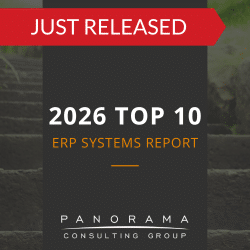From manufacturing and healthcare to finance and field service, companies in almost every industry have implemented some type of machine learning (ML) solution. This includes companies that have implemented ML as part of an ERP implementation.
This appetite for data insights has given rise to a concept known as machine learning as a service (MLaaS).
What is machine learning as a service and how could it help you get more out of your enterprise software? Let’s take a look.
The Basics of MLaaS
Machine learning is a branch of artificial intelligence that uses data and algorithms to learn on its own and make predictions with increasing accuracy.
When companies have access to machine learning as a service, they can reap all the benefits of ML without needing to host the solution in-house or invest in any specialized infrastructure. This is especially beneficial for small-to-midsized companies that might not be able to afford or support such technology.
Here’s a quick breakdown of how it works:
First, cloud service providers create a collection of cloud-based ML tools to support and provide frameworks for a variety of AI use cases:
- Face recognition
- Speech recognition
- ML training and tuning
- Predictive analytics
- Natural language processing (NLP)
- Trend forecasting
- Deep learning
- Data preprocessing
- Data visualization
- Customer support chatbots
Companies can select an MLaaS software licensing and delivery model that fits their needs, budget, and desire to scale. Once everything is set up, employees can use the cloud provider’s ML tools via remote access.
The 2025 ERP Report
72.6% of respondents said they've already deployed AI at their organizations. Learn about AI adoption and other ERP trends by downloading our latest report.
Benefits of Using MLaaS
The benefits of using MLaaS are vast, and mostly center on accessibility and affordability. Let’s look at some of the top ones.
1. Vendor-Hosted Solution
With this service, companies can quickly adopt ML models without creating their own (or assuming any of the risks). Then, they can use that technology to automate tasks and increase the efficiency of their workflows.
They don’t have to contend with any aspect of software installation and aren’t required to set up any servers. All those services are hosted by the vendor, and companies can use the ML services they need, such as data cleaning/preparation, data transformation, and model training.
Companies don’t have to worry about any of the computational resources that this technology requires. Instead, all the computation takes place through the provider’s data centers.
2. Data Management Support
As most MLaaS vendors are essentially cloud providers, companies can also access related services, including cloud storage and document management support.
A typical ML project can involve a massive amount of data, so these additional service offerings make it easier for teams to access and process the information they need.
3. Affordability
Setting up even one in-house ML workstation can be exorbitantly expensive.
It requires pricey hardware and premium GPUs. In addition to the cost of each component, there are also higher utility bills to juggle, as GPUs consume a large amount of electricity.
In contrast, many MLaaS vendors only require companies to pay for what they use. Others offer subscription-based pricing models.
3. No Coding Required
ML allows organizations to predict customer behavior, financial performance, and more.
However, this usually requires a significant amount of custom coding and the ability to handle model complexity and computational complexity.
Without an affordable way to keep data scientists and engineers on staff, smaller companies are often at a disadvantage.
That’s where MLaaS comes in. Companies can access all the data visualization tools they need to perform advanced predictive analytics.
In lieu of coding, some providers simplify the process even more, offering drag-and-drop platforms that help users do more with less.
Common MLaaS Applications
Nearly every sector can benefit from MLaaS. Some of the most common use cases and applications include:
- Developing virtual assistants or chatbots
- Improving quality assurance (QA) efforts in manufacturing
- Automating business documentation workflow and management
- Detecting data anomalies
- Using predictive and prescriptive analytics
- Increasing security around user authorizations (e.g., facial recognition)
- Conducting NLP tasks
- Creating product and service recommendation engines
In any of these use cases, reliable data is essential. Our software experts have found that data issues are one of the top reasons for ERP failure, so be sure you have the data you need to get the insights you desire.
The Future of MLaaS
We expect MLaaS to see impressive growth over the next few years. One report predicts that this industry will be valued at $304.82 billion by 2032, growing more than 36% between now and then.
Much of this rise is fueled by the fact that ML has become an integral part of almost every software-as-a-service (SaaS) offering.
For example, several of the top ERP systems feature integrated AI capabilities powered by machine learning.
One such vendor told us about their data science as a service offering for customers without their own data science teams. Using these services, companies can gradually experiment with use cases, such as asset intelligence, pricing intelligence, and customer intelligence.
What is Machine Learning as a Service? Learn More
Regardless of your industry niche, there’s a good chance that your organization can benefit from MLaaS.
What is machine learning as a service? Put simply, it could be the missing link between analyzing your data and taking informed and decisive action on it.
If you’re considering an ERP with AI capabilities, we can help you determine the steps necessary to take full advantage of it. Contact our team of ERP consultants to learn more.














